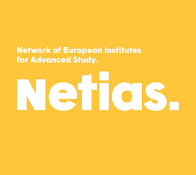Partners

The Network of European Institutes for Advanced Study brings together 25 Institutes for Advanced Study across Europe. It was created in 2004 to stimulate a dialogue on IAS practices and possible forms of cooperation. Within the whole network, more than 500 researchers are hosted every year for up to one full academic year.
The European Institutes for Advanced Study (EURIAS) Fellowship Programme is an international researcher mobility programme offering 10-month residencies in one of the 16 participating Institutes: Berlin, Bologna, Budapest, Cambridge, Delmenhorst, Edinburgh, Freiburg, Helsinki, Jerusalem, Lyon, Marseille, Paris, Uppsala, Vienna, Wassenaar, Zürich. The Institutes for Advanced Study support the focused, self-directed work of outstanding researchers. The fellows benefit from the finest intellectual and research conditions and from the stimulating environment of a multi-disciplinary and international community of first-rate scholars.
EURIAS Fellowships are mainly offered in the fields of the humanities and social sciences but may also be granted to scholars in life and exact sciences, provided that their proposed research project does not require laboratory facilities and that it interfaces with humanities and social sciences. The diversity of the 16 participating IAS offers a wide range of possible research contexts in Europe for worldwide scholars. Applicants may select up to three IAS outside their country of nationality or residence as possible host institutions.
List of participating institutes can be found here.

Unlike traditional Institutes for Advanced Study, UBIAS are associated with or embedded within a university, and actively contribute to the academic culture and the scientific achievements of their home university. By offering various fellowship programmes on different academic levels (junior and senior researchers), UBIAS institutes bring together outstanding researchers from different disciplines, nationalities and academic backgrounds, creating a productive environment for innovative research. These common characteristics have proved to be a fruitful basis for mutual exchange, although the individual institutes display a large variety of different concepts and academic pursuits. With their individual profiles, they answer to the specific needs and strengths of their affiliate university. While many institutes have traditionally concentrated on humanities and social sciences, an increasing number of institutes now incorporate theoretical and experimental sciences.
The UBIAS network was initiated in 2010, when representatives from 32 research institutes worldwide met at the conference entitled “University-Based Institutes for Advanced Study in a Global Perspective: Promises, Challenges, New Frontiers”, hosted by the Freiburg Institute of Advanced Studies, Germany. The founding of the first UBIAS dates back 40 years. However, the last 10 years have seen an upsurge in the establishment of such institutes across the globe – and this trend continues. The network was established to enable structured forms of exchange in this growing segment, including bi-annual conferences and joint programmes between partner institutes.
List of network participants can be found here.

The Open Society University Network has been established as a challenge and creative disruption to the existing divisions between different types of institutions, academic disciplines and cultures, mass and elite higher education, and academic research and public service. One of the pillars of OSUN’s mission is fostering critical thinking, open intellectual inquiry and rigorous research to support and promote open societies amid authoritarian resurgence.
The list of OSUN member institutions can be found here.

Consortium of Humanities Centers and Institutes (CHCI) is a global network of over 250 humanities centers, institutes, research libraries, and related organizations. Its main mission is to support the future of the humanities by nurturing new forms and methods of global interdisciplinary collaboration.
